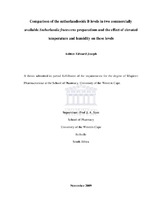Comparison of the sutherlandioside B levels in two commercially available Sutherlandia frutescence preparations and the effect of elevated temperature and humidity on these levels
Abstract
Sutherlandia frutescens (tribe Galegeae, Fabaceae), is a popular medicinal plant traditionally used in South Africa. In 2000, a company called Phyto Nova (Pty) Ltd. initiated large-scale cultivation and contract manufacturing of tablets, made from the powdered herb (i.e. thin stems and leaves). Most of these commercial Sutherlandia solid dosage forms are made from the dried leaf powder but recently a new product, viz. Promune™ capsules, made from a freeze-dried aqueous extract, came on the market and was claimed to be “better” as it mimics the traditional tea. However, the pharmaceutical quality and stability of these preparations have not yet been investigated. The objectives of this study were firstly, to develop a validated stability-indicating HPLC assay for sutherlandioside B (SU-B); secondly, to compare the SU-B levels in the two commercially available Sutherlandia products viz, the Phyto Nova Sutherlandia SU1™ tablet and the Promune™ capsule, and, thirdly, to determine the effect of elevated temperature and humidity as well as acid hydrolysis on the SU-B levels in these two products.

